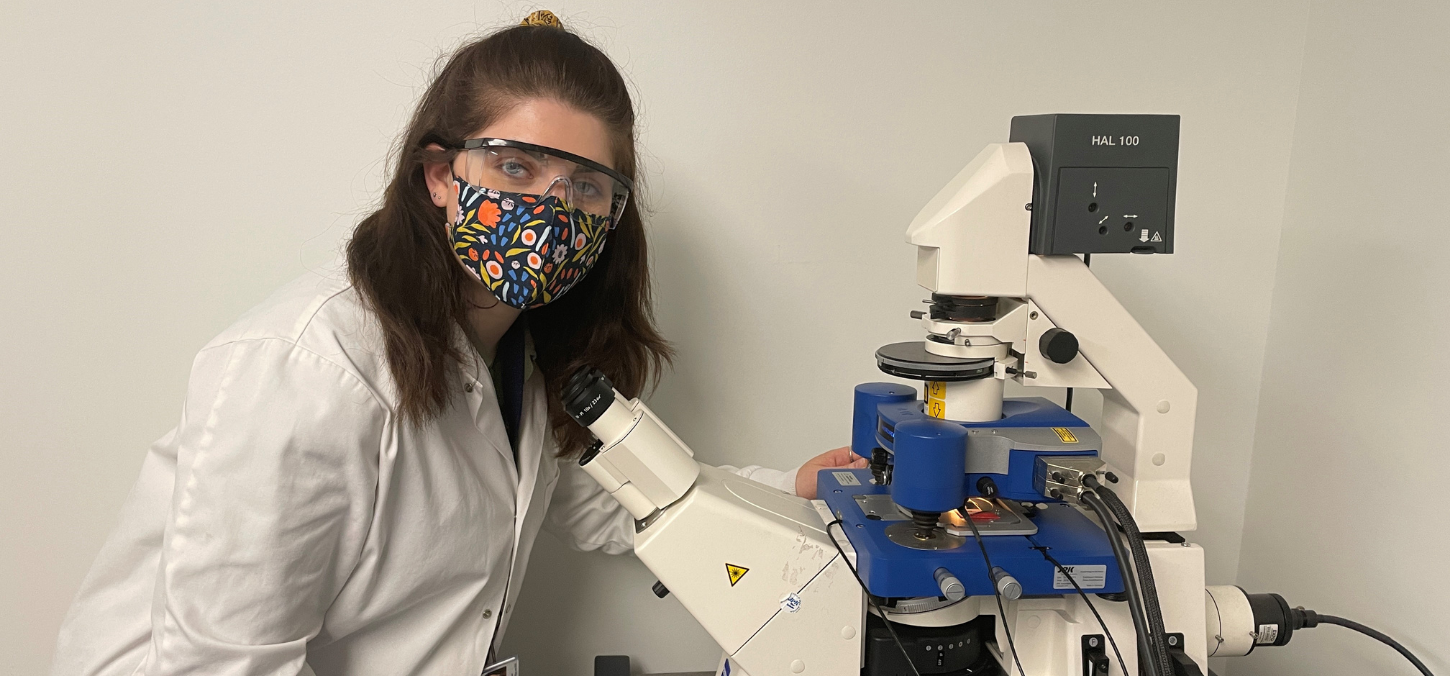
Q&A with international student Megan Williams
By Rachel Boutet
As associate professor, Laurent Bozec notes that international collaborations showcase the research capabilities of the Faculty and provide opportunities for an exchange of learning between two universities. Megan Williams from Cardiff University is currently at the Faculty of Dentistry as part of the Mitacs Globalink doctoral exchange scheme. We caught up with Megan about her placement.
Why did you want to come to the Faculty of Dentistry?
One of the primary reasons I came to the University of Toronto was because Dr. Bozec is based here and he is an expert in Atomic Force Microscopy (AFM). AFM is an imaging technique that would greatly benefit my PhD and is one that I have wanted to be trained in for some time. To have the opportunity to be trained and supervised by Dr. Bozec will not only provide data for my PhD, but on a personal level will also develop my own skills ahead of a future career in microbial research.
What are you most looking forward to about this placement?
I’m really looking forward to being able to network and collaborate with international researchers that I would not otherwise have the opportunity to meet. Experiencing different research environments and approaches to research will be hugely rewarding to me, will broaden my research perspective, and influence the way I approach research problems in the future. I am excited to obtain a working knowledge of AFM and single-cell force spectroscopy and produce novel and critical data for my PhD and future research papers. On a personal note, I am also grateful to have the opportunity to explore Toronto and learn more about Canadian culture.
Can you summarize your research study?
Research has indicated that certain species of bacteria (e.g. Streptococcus sanguinis and Streptococcus gordonii) modulate virulence of the fungus Candida albicans in mouth. These species can co-exist with C. albicans in denture biofilms promoting candida hyphal development, its increased epithelial invasion and damage, and upregulation of certain virulence genes. However, the underlying mechanisms behind this modulation are currently unknown. In this research, we are exploring how a hyphal specific adhesion protein (ALS3) mediates interactions between C. albicans and oral streptococci thereby potentiating increased C. albicans virulence. I will undertake my research at the Faculty of Dentistry, and it will involve the characterization of the adhesion and mechanical interactions between C. albicans and Streptococcus species using a single-cell force spectroscopy approach. This research will contribute to our understanding of why opportunistic infections in the mouth can be affected by the composition of oral bacterial community.
How will your experience at U of T benefit you when you return to Cardiff University?
Interdisciplinary research is vitally important to progress our knowledge of complex microbial diseases such as those in the mouth. Working with the Bozec Lab will equip me with novel research skills relating to AFM that I will to transfer to others on my return to the UK and Cardiff University. I will have had the immediate benefit of gaining valuable data to contribute to my PhD. However, in the longer term, my future career opportunities in research will have been expanded given the diverse range of AFM applications. Additionally, my intercultural understanding, communication and collaboration skills will have been further developed from my time at the University of Toronto and this will better equip me to future work both in, and outside the UK.
Why would you encourage other students to take part in an international exchange?
Gaining an understanding of another country’s perspective will inevitably influence the way someone thinks and works, benefiting their research in terms of approaching issues and the problems encountered. It also allows people to share their background and experience with others which is key to both personal and scientific development. Research generated in an internationally collaboration can lead to new findings that will ultimately provide benefits on a wider global scale.
Is there anything else you’d like to add?
I would like to thank the UKRI and Mitacs for funding this placement and putting together this opportunity. I would also like to thank GSK, the industrial partners of my PhD back home at Cardiff University and more specifically, David Bradshaw and Jonathan Pratten who were able to introduce me to Dr. Bozec and recommended him as a placement supervisor. I wouldn’t have been able to carry out this placement without the unwavering support from my home supervisor, professor David Williams, and now also the support of Dr. Bozec. Dr. Bozec and his lab members immediately made me feel part of their cohesive team that are always generous with their time with regard to training or just generally helping each other. I’m really enjoying my time at the Faculty where everyone has made me feel very welcome. It’s very fortunate that I like snow and that it is a novelty for me. While everyone around me seems to be waiting for spring, I’m enjoying every day of a truly beautiful Canadian winter which is something I could never forget.
Photo: Megan Williams